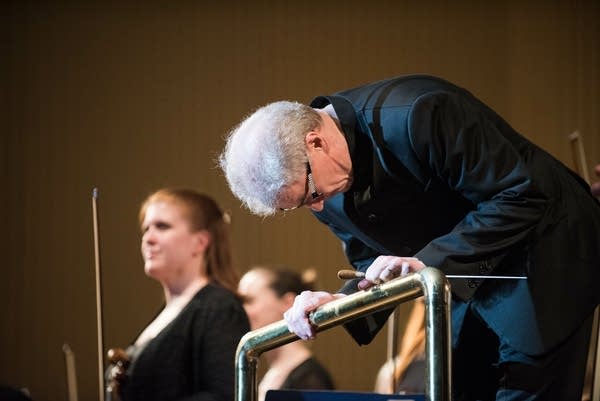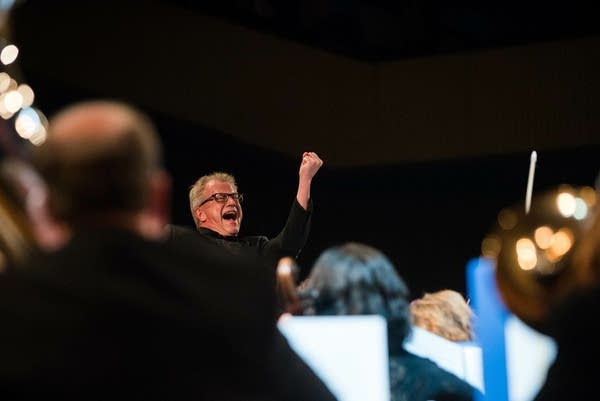'We belong to the community': Osmo Vänskä reflects on 19 years with the Minnesota Orchestra
He'll conduct his last concert as music director Sunday

Go Deeper.
Create an account or log in to save stories.
Like this?
Thanks for liking this story! We have added it to a list of your favorite stories.
Finnish conductor Osmo Vänskä ends his 19-year tenure with the Minnesota Orchestra this weekend.
He took over as music director of the Minnesota Orchestra in 2003, and before long Vänskä told the players he wanted them to be "the best orchestra in the country in four or five years." The orchestra responded with amazing playing, and by 2010 the critic of the New Yorker said they "sounded, to my ears, like the greatest orchestra in the world.”
There's been a Grammy award and groundbreaking tours, but back in 2012, Orchestra Hall fell silent as a lockout and labor dispute dragged on for over a year.
We wanted to look back at Vänskä's tenure with the Minnesota Orchestra.
Turn Up Your Support
MPR News helps you turn down the noise and build shared understanding. Turn up your support for this public resource and keep trusted journalism accessible to all.
You had written a letter to the orchestra’s board saying you were resigning because they had not come to terms with the musicians. And then there was a concert at the University of Minnesota’s Ted Mann Concert Hall; the musicians were playing independent of the Minnesota Orchestra. And you told the audience not to applaud. Those of us in the audience thought this could be the last concert by the Minnesota Orchestra — and likely would be the last concert with Osmo Vänskä conducting. Take us back to that night.
The name of the orchestra was The Musicians of the Minnesota Orchestra. And yeah, they were very, very hard times. I don't plan those kinds of actions ahead. It was a packed hall and I think that those people were really music lovers and they loved the Minnesota Orchestra players. And I just felt that I wanted to send a message that things are really dark right now, we are really close to the precipice. Surely don't celebrate now; we have to just think about this moment.
That's a rare thing, right? Usually conductors stay above those labor disputes.
I was told that it was better for me to go away from the Twin Cities and wait until everything was done. But I felt that was not right. It was an important moment for me, for the orchestra and for this community. Everything which has been done after that is based [on] those dark days.
When they asked me to come back, I said I don't want to come back to the old system. We have to change it. It's not right that the players are in one corner, the board is in one corner, the administration is one corner and they don't want to speak to each other. We need to do as much collaboration as possible. We need to listen to each other.
They call it now “Minnesota model” in other places — where we just want to think about what is good for the Minnesota Orchestra in the future. And I think that it's working very well, this orchestra. It's a group of people who are willing to do their best for the future of the orchestra.

Then, in 2020, just three and a half miles from Orchestra Hall, George Floyd was killed by a Minneapolis Police officer. And there was a racial reckoning that started in this city. How does this orchestra, in your opinion, respond to that reckoning?
We made the decision that every concert should have some new element. We cannot live at the museum as [an] artistic institution. We need to find out what is happening today.
And was that necessary for classical music? Was it too narrow in your opinion? Was it too — as some people say — elitist, white and male?
Yes, I think that's the the right way to say it. We have been working as a 100-year-old symphony orchestra and using too many of the same pieces and same composers. And we just wanted to change this, to show that we want to be open for all all kinds of new things.
You conducted “Starburst” by Jessie Montgomery. That's an exciting piece.
Jessie is a great, great composer and I’m sure her future is going to be bright.
If you're lucky enough to be on the side boxes, you can see more of your expressions when you're conducting. And sometimes, I think it's fair to say that you just seem ecstatic. What are we seeing when we see that?
Well, yes, I'm feeling it. That could be like, great, or it could be also sometimes that I am in tears. The music is not only about being happy, and happiness is not only about smiling. We have to go through some dark things sometimes in music, and then the hope is coming and that makes us happy. But without those dark feelings, sad feelings, the happiness is less good.
So you're saying that after all the preparation — you study the score, you rehearse it, you get ready — and even during a concert, you can actually be moved to tears from the playing of the Minnesota Orchestra?
Yeah. About the music, what the composer wrote.

What kind of a person would you like to see take over the orchestra?
Well, I am an outsider for the process. I have nothing to do with it, so I can tell you whatever I want. But I I just want to see this great orchestra be even better in the future. And I want to have a conductor who also is continuing this call for collaboration between the community and the arts — or let's say, the orchestra should be part of the community.
And I go back to the lockout when the community showed that you need the Minnesota Orchestra back on stage. I think that something was created also between the orchestra and the community of the Twin Cities during that time, and we have been good and strong because we belong to this community. I want the new guy or girl to take care of this and that this is going to be the orchestra of the Minnesotans.
Vänskä says he plans to stay in Minneapolis when his tenure ends. He's already been named conductor laureate at the Minnesota Orchestra.



